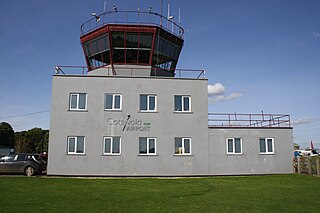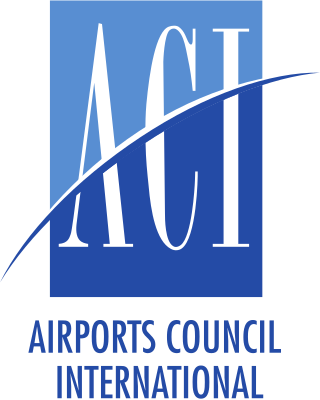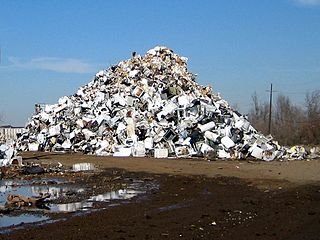
Pratt & Whitney is an American aerospace manufacturer with global service operations. It is a subsidiary of Raytheon Technologies. Pratt & Whitney's aircraft engines are widely used in both civil aviation and military aviation. Its headquarters are in East Hartford, Connecticut. As one of the "big three" aero-engine manufacturers, it competes with General Electric and Rolls-Royce, although it has also formed joint ventures with both of these companies. In addition to aircraft engines, Pratt & Whitney manufactures gas turbines for industrial and power generation, and marine turbines. In 2017, the company reported that in 2014 they had 38,737 employees supporting more than 11,000 customers in 180 countries around the world. In 2013, Pratt & Whitney's revenue totaled $14.5 billion.

The mechanical structure of an aircraft is known as the airframe. This structure is typically considered to include the fuselage, undercarriage, empennage and wings, and excludes the propulsion system.
The United Aircraft and Transport Corporation was formed in 1929, when William Boeing of Boeing Airplane & Transport Corporation teamed up with Frederick Rentschler of Pratt & Whitney to form a large, vertically-integrated, amalgamated firm, uniting business interests in all aspects of aviation—a combination of airframe and aircraft engine manufacturing and airline business, to serve all aviation markets, both civil aviation and military aviation.

In the context of physical construction, deconstruction is the selective dismantlement of building components, specifically for reuse, repurposing, recycling, and waste management. It differs from demolition where a site is cleared of its building by the most expedient means. Deconstruction has also been defined as "construction in reverse". Deconstruction requires a substantially higher degree of hands-on labor than does traditional demolition, but as such provides a viable platform for unskilled or unemployed workers to receive job skills training. The process of dismantling structures is an ancient activity that has been revived by the growing fields of sustainable and green building.

Cotswold Airport is a private general aviation airport, near the village of Kemble in Gloucestershire, England. Located 4.5 NM southwest of Cirencester, it was built as a Royal Air Force (RAF) station and was known as RAF Kemble. The Red Arrows aerobatics team was based there until 1983. Today it is used for the storage and recycling of retired airliners, as well as flying schools, clubs, and industry.
Nadcap is a global cooperative accreditation program for aerospace engineering, defense and related industries.
Active Disassembly (AD) is a developing technology which is associated with the term active disassembly using smart materials (ADSM)

The Boeing Skyfox is an American twin-engined jet trainer aircraft, a highly upgraded development of the Lockheed T-33. It was designed as a primary trainer to compete with and replace the Cessna T-37 Tweet. Besides its primary role as a trainer, the aircraft was envisioned to have other roles as well, including ground attack. The program was started by the Skyfox Corporation in 1983, and was acquired by Boeing in 1986.
PATTS College of Aeronautics, also known as Philippine Air Transport and Training Services, is an aeronautical school at Lombos Ave., Brgy. San Isidro, Parañaque, Metro Manila, Philippines. It was founded by Atty. Ambrosio R. Valdez Sr.
Aircraft End-of-Life Solutions (AELS) B.V. is a company that disassembles and dismantles aircraft that are out of service or retired. The company is situated in Enschede, Netherlands and has the ability to scrap worldwide.
Spartan College of Aeronautics and Technology (Spartan) is a private for-profit aviation college in Tulsa, Oklahoma. It was originally established to provide pilot and technicians for Spartan Aircraft Company but outlived its parent company and continues to train pilots and mechanics into the 21st Century. The main campus is adjacent to Tulsa International Airport, with another campus used for flight training at Richard Lloyd Jones Jr. Airport.

The aircraft design process is a loosely defined method used to balance many competing and demanding requirements to produce an aircraft that is strong, lightweight, economical and can carry an adequate payload while being sufficiently reliable to safely fly for the design life of the aircraft. Similar to, but more exacting than, the usual engineering design process, the technique is highly iterative, involving high level configuration tradeoffs, a mixture of analysis and testing and the detailed examination of the adequacy of every part of the structure. For some types of aircraft, the design process is regulated by civil airworthiness authorities.

Airports Council International (ACI) is an organization of airport authorities aimed at unifying industry practices for airport standards. Established in 1991, its headquarters are based in Montreal, Quebec, Canada, and its members operate nearly 2000 airports.

FL Technics is a global provider of aircraft maintenance, repair and overhaul (MRO) services, headquartered in Vilnius, Lithuania. The company has Base Maintenance facilities in Lithuania, Indonesia and China and provides Line Maintenance support across Europe, Africa, Asia-Pacific, and the CIS states.

AerSale, Inc. is a Coral Gables, Florida-based global supplier of aftermarket commercial jet aircraft, engines, Original Equipment Manufacturer (OEM) used serviceable material, maintenance, repair and overhaul (MRO), and aeronautical engineering services to passenger and cargo airlines, government entities, leasing companies, multinational OEMs, and independent MROs.

Appliance recycling is the process of dismantling scrapped home appliances to recover their parts or materials for reuse. Recycling appliances for their original or other purposes, involves disassembly, removal of hazardous components and destruction of the equipment to recover materials, generally by shredding, sorting and grading. The rate at which appliances are discarded has increased due in part to obsolescence due to technological advancement, and in part to not being designed to be repairable. The main types of appliances that are recycled are televisions, refrigerators, air conditioners, washing machines, and computers. When appliances are recycled, they can be looked upon as a valuable resources; if disposed of improperly, they can be environmentally harmful and poison ecosystems.
The ecoDemonstrator Program is a Boeing flight test research program, which has used a series of specially modified aircraft to develop and test aviation technologies designed to improve fuel economy and reduce the noise and ecological footprint of airliners.
Demanufacturing is a process where a product after extensive usage, often at the end of its lifespan, is then disassembled into components, the components are classified as to functionality and components suitable for reuse are again to returned to a product for reuse, components that are deemed unusable are typically recycled to be used in new products. Demanufacturing was proposed to be used in all industries as a means reduce the environmental footprint while preserving economic viability of the processes involved. This term was first coined by Professor Walter W. Olson and Professor John W. Sutherland in 1993.

Aircraft recycling is the process of scrapping and disassembling retired aircraft, and re-purposing their parts as spare parts or scrap. Airplanes are made of around 800 to 1000 parts that can be recycled, with the majority of them made from metal alloys and composite materials. The two most common metal alloys are aluminum and titanium and the main composite material is carbon fiber.
Scroggins Aviation is an American aircraft salvage and aviation movie special effects company based in Las Vegas, Nevada. It has provided special effects for several network television shows and feature films.










